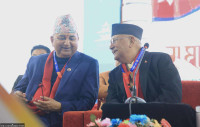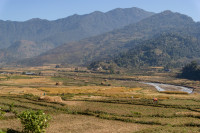Opinion
Fixing a nation
Economic self-reliance depends on the formation of financial, human, institutional and social capital and their quality
Y B Thapa
The ongoing discourse on the impact and lessons of the Indian blockade on Nepal has significant implications for our economic institutions and individual habits. The blockade has reminded us that India can easily ignore her bilateral treaties on trade and transit. More importantly, it has reinforced the importance of economic self-reliance and balanced development.
According to the Nepal Rastra Bank, if the blockade persists till mid-January 2016 or for six months, it can diminish the economic growth rate from an expected 5.05 to -1.10 percent this year. Poverty could increase from 17 to 23.5 percent in 2015, and if that happens, it would take three years just to revert back to the current level.
Four steps
In the past four decades, Nepal has faced three blockades imposed by India—twice when it was a monarchy and now as a federal republic. The question is: what does it take to transform an agrarian and fragile economy such Nepal’s to a modern economy that has a strong inter-industry relations, market efficiency, basic or strategic necessities in abundance, and dependable, diversified and secure international economic complementarities. Douglas North’s views on new institutional economics can be of particular relevance for us here.
Nobel laureate North Douglas and others in ‘Violence and Social Order: A Conceptual Framework for Interpreting Recorded Human History’ (2009) have listed three doorstep conditions for evolving into a modern, open access economy: rule of law for elites; support for perpetually lived public and private organisations; and consolidated control of the military. Thus, economic institutions are derivatives of political institutions, and how they work to vis-à-vis aspirations of the country and people is a moot question.
An alternative view of economic development argues that economic self-reliance is the ability of an agency to garner and hold economic resources in excess of their ‘basic needs’; it provides greater resilience during negative economic shocks, lowers the suffering in intensity or duration, and provides a solid platform for the people to develop their talents, skills, emotions, and values. Economic self-reliance depends on the formation of financial, human, institutional and social capital, and their quality.
Genesis of ills
Since the blockade, Nepalis have not only faced an acute scarcity of necessities but have also been coping with price inflation, black marketing, smuggling, and border violations. Are such economic malfunctions related to structural failures in capital formation in the past? One such failure relates to financial capital management by the government, business firms and households. The Finance Ministry has the comfort of balancing the budgets based on foreign aid and the Nepal Rastra Bank has a good balance of payments due to workers’ remittances. But it seems to have resulted in ‘Dutch disease’—significant spike in one economic sector leading to decline in others. Our institutions encourage consumption of imports to the detriment of domestic saving rates, which are hardly 10 percent of the Gross Domestic Product. Examples include lower tariffs and taxes, overvaluation of Nepali currency in relation to Indian rupees, lower interest rates, and easy credit for imports of alcohols, small vehicles and assembly activities. None of these activities strengthen the economy.
Therefore, the National Planning Commission, Rastra Bank and Federation of Nepalese Chambers of Commerce and Industry need to improve the allocation of financial capital for strategic industries for self-reliance, and increase the share of investment for lead sectors like transport, storage and markets, manufacturing, and border custom-ports both in the north and south.
Second, we need to increase the productivity of our human capital so that it can better contribute to stability, growth and prosperity. As mentioned in the World Economic Forum’s Human Capital Report 2013, the planning for human capital formation needs to transcend political cycles or business investment horizons. Investing in our primary, secondary, tertiary education is crucial as they provide skills to the workforce. But by importing a huge number of labourers from India and providing them naturalised citizenship while exporting indigenous workforce to foreign markets, we have created a demographic imbalance beyond our assimilation capacity.
Third, institutional capital continues to remain the weakest link in our economy. Nepal has a special peace and friendship treaty with India in addition to the Bilateral Investment Promotion and Protection Agreement (BIPPA). But we do not have similar understandings either with China or other countries. However, it is essential to maintain symmetric relations with neighbours to buffer and neutralise external demands and pressures.
Finally, social capital, the glue that binds institutions together for society’s cohesion, has come under pressure due to the propaganda of both the democrats and radicals, and the fissures created by identity-based federalism. Government agencies, along with civil society and media thus need to act in unison and proactively secure our national interest in our dealings with rest of the world. Nepal must also advocate for a stronger Saarc and Bimstec and strengthen its diaspora to build on the trust, network, and values of small nations.
Agenda and agency
It is now time for us to move away from describing the Indian blockade’s socio-economic and security effects to explaining its underlying causes, and for correcting our mindsets, habits and institutions. We need to increase our hold on strategic resources and necessities by building our financial, human, institutional and social assets.
Of all the economic variables, we need to emphasise on economic and institutional capital the most to give the country a sense of purpose and direction. Specifically, the Finance Ministry and Rastra Bank should have used the pricing of commodity and foreign exchanges, and their allocations to rationalise the consumption habits for boosting domestic savings; and increase internal investment. Likewise, attention should be paid not to increase the quality of workforce produced in the country such that people can compete in foreign markets.
Nepal needs to build its diplomatic capacities in the face of growing Sino-Indian proximity and alliance in global institutions, and businesses. It needs to be careful to neither use, nor to be used, overtly or covertly by its giant neighbours. We must be proactive in using platforms such as the Saarc and Bimtec to our benefit.
Thapa is former member of National Planning Commission




 15.12°C Kathmandu
15.12°C Kathmandu










